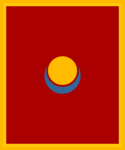Qavarjeri
The Great United Benevolent State of All Chuyan Peoples | |
|---|---|
|
Flag | |
| Capital | Samkerch |
| Official languages | Qavar |
| Demonym(s) | Qavarjerese |
| Government | Devolved Parliamentary Monarchy |
• Khan | Yusuf IV |
| Darya Fahadi | |
| Establishment | |
• Division of Uluujol | 1511 |
• Territorial Separation from Uluujol | 1652 |
• Pact of Ahteel | 1817 |
| Population | |
• 2023 estimate | 26,792,557 |
• 2020 census | 25,357,468 |
| GDP (PPP) | estimate |
• Per capita | USD$15,813 |
| GDP (nominal) | estimate |
• Total | USD$423.67 billion |
| Currency | Soum (QV$) |
| Time zone | West Ochran |
| Driving side | right |
Qavarjeri, also sometimes known as Qavaria or the Red Khanate, is a sovereign state in northwest Ochran. It directly borders Velikoslavia and shares a maritime border with Usezoya. It is notable for its large size and comparatively-sparse population, as well as for approximately one-fifth of the country's land area resting at or above the Arctic Circle.
Qavarjeri is claims to be and is often considered a rump or remnant state of the medieval Jade Road Khaganate, and due to its claims of direct lineage therefrom, experiences a certain level of standing diplomatic tension with Untsangasar, which makes similar claims. Qavarjeri's population is dominated by two ethnic groups, the Chuyan-speaking Qavar people and the Azagartian-speaking Dahti people, although there are also significant paleo-Untsangasari populations, particularly within the country's north. The most-notable of these are the Yakan and Kanduar peoples. Other Chuyan ethnolinguistic groups exist, as well as other Paleo-Untsangasaris, although they are not as numerous.
The country is ruled by a constitutional monarchy at the national level, although as part of its political evolution to maintain the peace among the various peoples it has devolved home-rule to various regions and peoples, so the form of government varies among various subdivisions.
